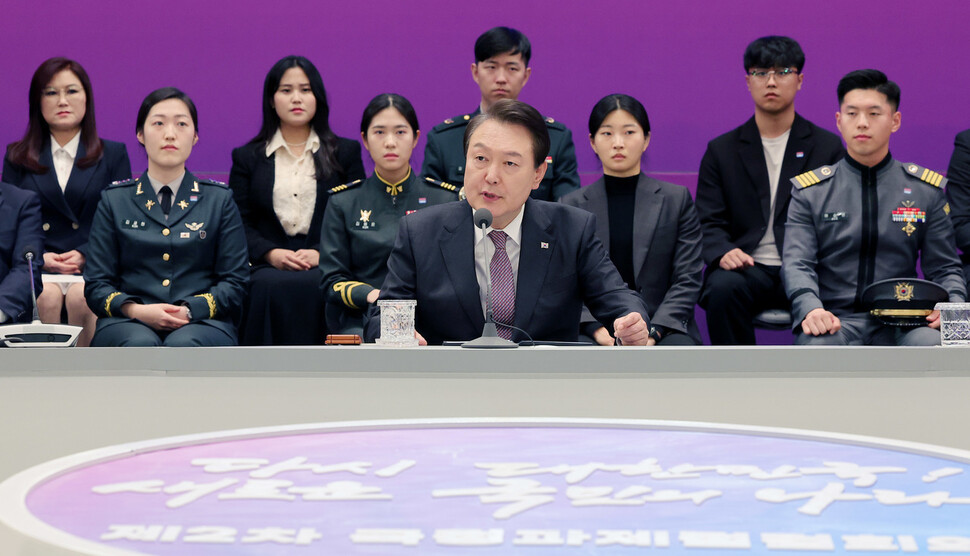President Yoon Seok-yeol speaks at the 2nd national task inspection meeting held at the Blue House guesthouse on the 5th. President’s Photo Correspondents
On the 5th, President Yoon Seok-yeol reviewed the government’s state affairs tasks on foreign affairs and security issues and repeatedly said, “Trilateral cooperation between Korea, the US, and Japan is more important than ever to overcome complex crises and challenges including the North Korean nuclear threat.” It highlighted the US-Japan closeness. Domestic public opinion is boiling over after the South Korea-Japan summit held on the 16th of last month, but President Yoon emphasized the necessity of cooperation by mentioning the “common interest” of Korea-Japan relations that day. After the Korea-Japan summit, which sparked controversy over “humiliation diplomacy,” he declared “My Way,” saying he would stick to the existing policy despite criticism pouring in on the government’s foreign strategy and philosophy. In the opening remarks of the second state affairs inspection meeting held at the Blue House guesthouse on the afternoon of the same day, President Yoon said, “Solidarity and cooperation between countries that share universal values is not only our survival and national interest in the international community, but also the constitutional values of liberal democracy and the market economy system. It is a direct issue,” he said. President Yoon went on to say, “The ROK-US alliance has already evolved from a military security alliance to a comprehensive global strategic alliance, and the importance of Korea-Japan relations cannot be overemphasized.” Strategy presentation, economic security cooperation with Saudi Arabia and the United Arab Emirates (UAE), and sales diplomacy that can generate economic results from summit diplomacy were highlighted as diplomatic achievements. President Yoon also said, “The center of diplomacy is the economy.” On this day, President Yoon spent a lot of time discussing human rights issues to which North Korea reacts sensitively, saying, “Informing the reality of human rights in North Korea is to protect national security.” On the 31st of last month, the government publicly published the North Korean Human Rights Report for the first time since the enactment of the North Korean Human Rights Act in 2016. President Yoon also emphasized, “We need to establish a firm view of the enemy and military discipline so that we can fight and defeat any threat from North Korea, and maximize our strength through actual combat training.” At the same time, President Yoon said to the Ministry of Unification, “According to the results of the recent investigation, it was revealed that domestic groups engaged in espionage under the direction of agencies affiliated with the United Front Department of North Korea. It is necessary to prepare well for things such as publicity and counter-psychological warfare so that people do not fall for it.” In response, Minister of Unification Kwon Young-se replied, “I will accumulate relevant data so that I can hold North Korean human rights violators accountable someday.” Following the first meeting on December 15 last year, the meeting held on the subject of diplomacy, unification, national defense, and veterans did not mention any explanations or future plans related to South Korea-Japan relations, which are of public interest. It is said that among the 102 panel members, consisting of experts and public audience members, neither victims of forced labor nor related groups were invited. This is the reason why it is pointed out that rather than explaining and communicating policies to them in detail amid strong opposition from key parties surrounding pending issues in both countries, it was merely a one-sided message of ‘self-congratulation’. A key official from the presidential office met with reporters at the presidential office in Yongsan that day and said, “We could not confirm whether there were victims of forced conscription (mobilization) (at the meeting).” It seems that there was a remark to the effect of ‘resolving current issues well’.” Reporter Mina Kim [email protected]


